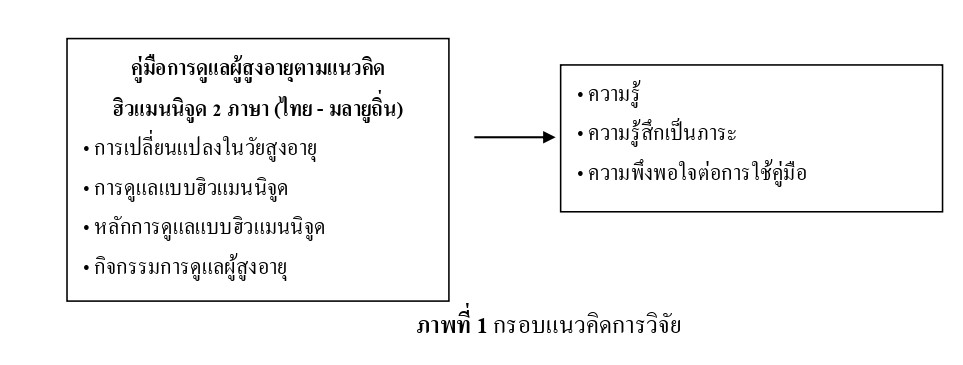ประสิทธิผลของการใช้คู่มือการดูแลผู้สูงอายุตามแนวคิดฮิวแมนนิจูด 2 ภาษา (ไทย - มลายูถิ่น) ต่อความรู้ ความรู้สึกเป็นภาระของผู้ดูแล และความพึงพอใจ ของผู้ดูแลผู้สูงอายุในเขตอำเภอเมือง จังหวัดนราธิวาส
สุภาวดี อดิศัยศักดา
คำสำคัญ:
คู่มือการดูแลตามแนวคิดฮิวแมนนิจูด(ไทย - มลายูถิ่น), ความรู้, ความรู้สึกเป็นภาระ, ความพึง พอใจ, ผู้ดูแลผู้สูงอายุบทคัดย่อ
การวิจัยนี้ เป็นการวิจัยกึ่งทดลองแบบกลุ่มเดียววัดก่อนและหลัง มีวัตถุประสงค์ 1) เพื่อศึกษาระดับความรู้ ความรู้สึกเป็นภาระ และความพึงพอใจของผู้ดูแลผู้สูงอายุในเขตอำเภอเมือง จังหวัดนราธิวาสก่อนและหลังการใช้คู่มือการดูแลผู้สูงอายุตามแนวคิดฮิวแมนนิจูด 2 ภาษา (ไทย - มลายูถิ่น)และ 2) เพื่อเปรียบเทียบคะแนนเฉลี่ยความรู้และความรู้สึกเป็นภาระของผู้ดูแลผู้สูงอายุ ก่อนและหลังการใช้คู่มือ กลุ่มตัวอย่างคือ ผู้ดูแลผู้สูงอายุในเขตอำเภอเมือง จังหวัดนราธิวาส จำนวน 30 คน
เก็บรวบรวมข้อมูลก่อนและหลังการทดลอง 1 สัปดาห์ โดยใช้แบบสอบถามข้อมูลส่วนบุคคล แบบวัดความรู้ แบบวัดความรู้สึกเป็นภาระของผู้ดูแล แบบวัดความพึงพอใจ และคู่มือการดูแลผู้สูงอายุ โดยมีค่าความเชื่อมั่น คือ 0.89, 0.99 และ 0.89 ตามลำดับ วิเคราะห์ข้อมูล โดยใช้สถิติเชิงพรรณาและสถิติ
การทดสอบจากประชากรเพียงกลุ่มเดียว แต่จะทำการทดสอบซ้ำ 2 ครั้ง ผลการศึกษาพบว่า หลังใช้คู่มือการดูแลผู้สูงอายุตามแนวคิดฮิวแมนนิจูด 2 ภาษา (ไทย - มลายูถิ่น) ผู้ดูแลผู้สูงอายุ มีความรู้ (t = 15.05, p < .05) สูงกว่าก่อนการใช้คู่มืออย่างมีนัยสำคัญทางสถิติที่ระดับ .05 ความรู้สึกเป็นภาระของผู้ดูแล (t = 9.735, p < .05) ต่ำกว่าก่อนใช้คู่มืออย่างมีนัยสำคัญทางสถิติที่ระดับ .05 และค่าเฉลี่ยความพึงพอใจต่อการใช้คู่มืออยู่ในระดับมาก (X = 4.17, S.D.= 0.55)
ผลการวิจัยบ่งชี้ว่า คู่มือมีประสิทธิผลที่ดี หน่วยงานที่เกี่ยวข้องสามารถจัดทำและพัฒนาคู่มือเพื่อเป็นแหล่งความรู้ที่เข้าถึงและเข้าใจได้ง่าย โดยใช้ภาษาท้องถิ่นเพื่อให้ผู้ดูแลมีความรู้ในการดูแลผู้สูงอายุ ลดความรู้สึกเป็นภาระในการดูแล และผู้สูงอายุได้รับการดูแลที่เหมาะสม
เอกสารอ้างอิง
Boonvas, K., Supanunt, T., Chunhabordee, A., & Wae, N. (2021). Caregiver stress and needs in caring disabled. The Southern College Network Journal of Nursing and Public Health, 4(1), 207 - 208.
Erdfelder, E., Faul, F., & Buchner, M. (2007). Statistical power analyses using G*Power 3.1: Tests for correlation and regressionanalyses. Behavior Research Methods, 41(4), 1149 - 1160.
Foundation of Thai Gerontology Research and Mental institute. (2021). Situation of the thai elderly. Institute for Population and Social Research, Mahidol University. 120 - 122.
Foundation of Thai Gerontology Research and Mental institute. (2023). Situation of the thai elderly. Institute for Population and Social Research, Mahidol University. 137 - 147.
Gineste, Y., & Marescotti, J. (2008). Humanitude: comprendre la vieillesse, prendre soin deshom mes vieux: A. Colin.
Honda, M., Mori, M., Hayashi, S., Moriya, K., Marescotti, R., & Gineste, Y. (2013). The effectiveness of french origin dementia care method; humanitude to acute care hospitals in Japan. European Geriatric Medicine, 2(4), 207 - 216.
Ito, M., & Honda, M. (2015). Improvement of behavioral and psychological symptoms of dementia (BPSD) by comprehensive standardized care methodology. Austin Journal Clinical Neurology, 2(9), 1 - 2.
Likert, R. (1967). “The Method of Constructing and Attitude Scale”, Reading in attitude theory and measurement. P.90 - 95. Fishbeic, Matin, Ed. New York: Wiley & Son.
Lumsan, S., & Kespichayawattana, J. (2022). The effect of promotion humanitude care program on caregiving stress of caregivers in Ban bang khae social welfare development center for older persons. (Master of Nursing Science, Gerontological nursing). Faculty of Nursing, Chulalongkorn University, Bangkok, Pathumwan. (in Thai).
Melo, R., Pereira, A., Fernandes, E., Freitas, N., & Melo, A. (2017). Prevention of skin tears in the dependent older person: contribuition of the humanitude care methodology. Millenium, 2(3), 45 - 51.
Preamthong, S., & Kespichayawattana, J. (2018). The effect of using humanitude concept by family caregivers care on depression in older persons with stroke. Journal of The Royal Thai Army Nurses, 19(1), 221 - 230.
Puthiwatanatharadol, T., & Kespichayawattana, J. (2017). The effect of humanitude care by caregiver on agitation behaviors of older people with dementia. (Master of Nursing Science, Geronto logical nursing). Faculty of Nursing, Chulalongkorn University, Bangkok, Pathumwan. (in Thai).
Srihaklang, P., & Sasat, S. (2016). The effect of caregiving skill development and caregiver support group program on stress in caregiver older persons with terminal stage cancer. Journal of The Police Nurses, 8(1), 1 - 10.
Sumcharoen, C. (2021). Factors predicting family caregiver's strain from care activities for bed-bound older adults at home. The Journal of Thailand and Midwifery Nursing Council, 36(1), 150 - 166.
Toonsiri, C., Sunsern, R., & Lawang, W. (2011). Development of the burden interview for caregivers of patients with chronic illness. Journal of Nursing and Education, 4(1), 63 - 75.
Zarit, S.H. (1990). Relatives of the impaired elderly: correlated of feelings of burden. Journal of Gerontologist, 20(6), 649 - 55.

ดาวน์โหลด
เผยแพร่แล้ว
รูปแบบการอ้างอิง
ฉบับ
ประเภทบทความ
สัญญาอนุญาต
ลิขสิทธิ์ (c) 2023 วารสารมหาวิทยาลัยนราธิวาสราชนครินทร์

อนุญาตภายใต้เงื่อนไข Creative Commons Attribution-NonCommercial-NoDerivatives 4.0 International License.



